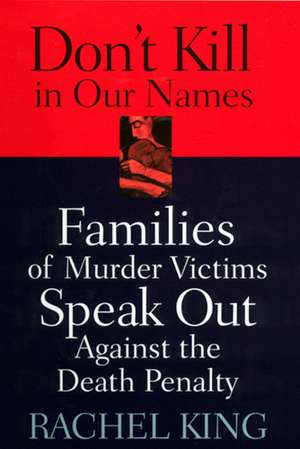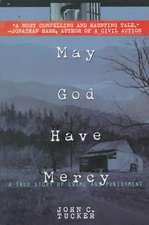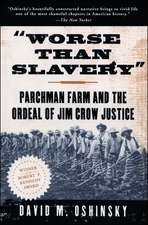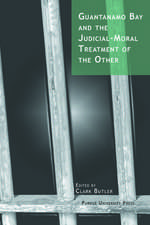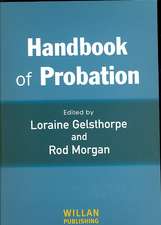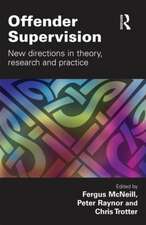Don't Kill in Our Names: Families of Murder Victims Speak Out against the Death Penalty
Autor Rachel Kingen Limba Engleză Hardback – 2 ian 2003
Could you forgive the murderer of your husband? Your mother? Your son?
Families of murder victims are often ardent and very public supporters of the death penalty. But the people whose stories appear in this book have chosen instead to forgive their loved ones’ murderers, and many have developed personal relationships with the killers and have even worked to save their lives. They have formed a nationwide group, Murder Victims’ Families for Reconciliation (MVFR), to oppose the death penalty.
MVFR members are often treated as either saints or lunatics, but the truth is that they are neither. They are ordinary people who have responded to an extraordinary and devastating tragedy with courage and faith, choosing reconciliation over retribution, healing over hatred. Believing that the death penalty is a form of social violence that only repeats and perpetuates the violence that claimed their loved one’s lives, they hold out the hope of redemption even for those who have committed the most hideous crimes.
Weaving third-person narrative with wrenching first-hand accounts, King presents the stories of ten MVFR members. Each is a heartrending tale of grief, soul searching, and of the challenge to choose forgiveness instead of revenge. These stories, which King sets in the context of the national discussion over the death penalty debate and restorative versus retributive justice, will appeal not only to those who oppose the death penalty, but also to those who strive to understand how people can forgive the seemingly unforgivable.
Families of murder victims are often ardent and very public supporters of the death penalty. But the people whose stories appear in this book have chosen instead to forgive their loved ones’ murderers, and many have developed personal relationships with the killers and have even worked to save their lives. They have formed a nationwide group, Murder Victims’ Families for Reconciliation (MVFR), to oppose the death penalty.
MVFR members are often treated as either saints or lunatics, but the truth is that they are neither. They are ordinary people who have responded to an extraordinary and devastating tragedy with courage and faith, choosing reconciliation over retribution, healing over hatred. Believing that the death penalty is a form of social violence that only repeats and perpetuates the violence that claimed their loved one’s lives, they hold out the hope of redemption even for those who have committed the most hideous crimes.
Weaving third-person narrative with wrenching first-hand accounts, King presents the stories of ten MVFR members. Each is a heartrending tale of grief, soul searching, and of the challenge to choose forgiveness instead of revenge. These stories, which King sets in the context of the national discussion over the death penalty debate and restorative versus retributive justice, will appeal not only to those who oppose the death penalty, but also to those who strive to understand how people can forgive the seemingly unforgivable.
Preț: 253.39 lei
Nou
Puncte Express: 380
Preț estimativ în valută:
48.49€ • 51.85$ • 40.43£
48.49€ • 51.85$ • 40.43£
Carte tipărită la comandă
Livrare economică 17 aprilie-01 mai
Preluare comenzi: 021 569.72.76
Specificații
ISBN-13: 9780813531823
ISBN-10: 0813531829
Pagini: 304
Ilustrații: 1
Dimensiuni: 156 x 235 x 25 mm
Greutate: 0.66 kg
Ediția:None
Editura: Rutgers University Press
Colecția Rutgers University Press
ISBN-10: 0813531829
Pagini: 304
Ilustrații: 1
Dimensiuni: 156 x 235 x 25 mm
Greutate: 0.66 kg
Ediția:None
Editura: Rutgers University Press
Colecția Rutgers University Press
Notă biografică
RACHEL KING is a legislative counsel for the American Civil Liberties Union's Washington national office where she lobbies on crime policy.
Cuprins
Preface
Acknowledgments
Introduction
I. Forgiveness
Chapter 1. The Lost Child
Chapter 2. Turning Grief into Love
Chapter 3. The Last Party
II. Executing the Vulnerable
Chapter 4. The Answer Is Love and Compassion
Chapter 5. The Last Word
Chapter 6. Keep Hope Alive
III. Grave Injustices
Chapter 7. Rush to Judgement
Chapter 8. Making Choices
IV. Restorative Justice
Chapter 9. Beyond Retribution
Chapter 10. Healing the Soul
Afterword
Notes
Resources
Acknowledgments
Introduction
I. Forgiveness
Chapter 1. The Lost Child
Chapter 2. Turning Grief into Love
Chapter 3. The Last Party
II. Executing the Vulnerable
Chapter 4. The Answer Is Love and Compassion
Chapter 5. The Last Word
Chapter 6. Keep Hope Alive
III. Grave Injustices
Chapter 7. Rush to Judgement
Chapter 8. Making Choices
IV. Restorative Justice
Chapter 9. Beyond Retribution
Chapter 10. Healing the Soul
Afterword
Notes
Resources
Recenzii
Particularly disturbing are stories that involve the sentencing to death of retarded convicts and juveniles. The testimony of families of murder victims is key to anti-death penalty campaigners, and these moving accounts might touch readers who are wavering on the issue.
Too often, family members who oppose the death penalty are silenced, marginalized, and abandoned, even by the people who are theoretically charged with helping them. Don't Kill in Our Names gives voice to murder victims' family members who are not seeking the execution solution to heal their pain. I highly recommend it, especially for those who care about victims' rights.
Descriere
Families of murder victims are often ardent and very public supporters of the death penalty. But the people whose stories appear in this book have chosen instead to forgive their loved ones’ murderers, and many have developed personal relationships with the killers and have even worked to save their lives. They have formed a nationwide group, Murder Victims’ Families for Reconciliation (MVFR), to oppose the death penalty. Weaving third-person narrative with wrenching first-hand accounts, King presents the stories of ten MVFR members. These stories will appeal not only to those who oppose the death penalty, but also to those who strive to understand how people can forgive the seemingly unforgivable.
